Critical Literature Review: Mental Health Nursing Challenges
VerifiedAdded on 2023/01/07
|12
|3978
|34
Report
AI Summary
This report is a critical literature review exploring the challenges faced by nursing professionals in the context of mental health. The introduction establishes the significance of the topic, highlighting the impact of mental health issues on nurses and patients, and outlines the objectives, which include exploring associated factors and recommending strategies for addressing the challenges. The literature review delves into factors such as lack of resources, patient resistance to treatment, and increasing staff turnover, which contribute to stress and frustration among nurses. The review also discusses the dangerous working environments and the risk of infections. The report then recommends strategies such as increasing resources, improving working conditions, implementing safety measures, adopting better recruitment strategies, providing training, and promoting team working to mitigate these challenges. The study's significance lies in its examination of how these factors affect the mental health of nurses and patients. The report uses a systematic literature search strategy, including the PICO framework, to identify relevant studies. The conclusion emphasizes the importance of addressing these challenges to improve patient care and the well-being of healthcare professionals. The report is based on the PUBH1080 Research Methods 3 assignment.
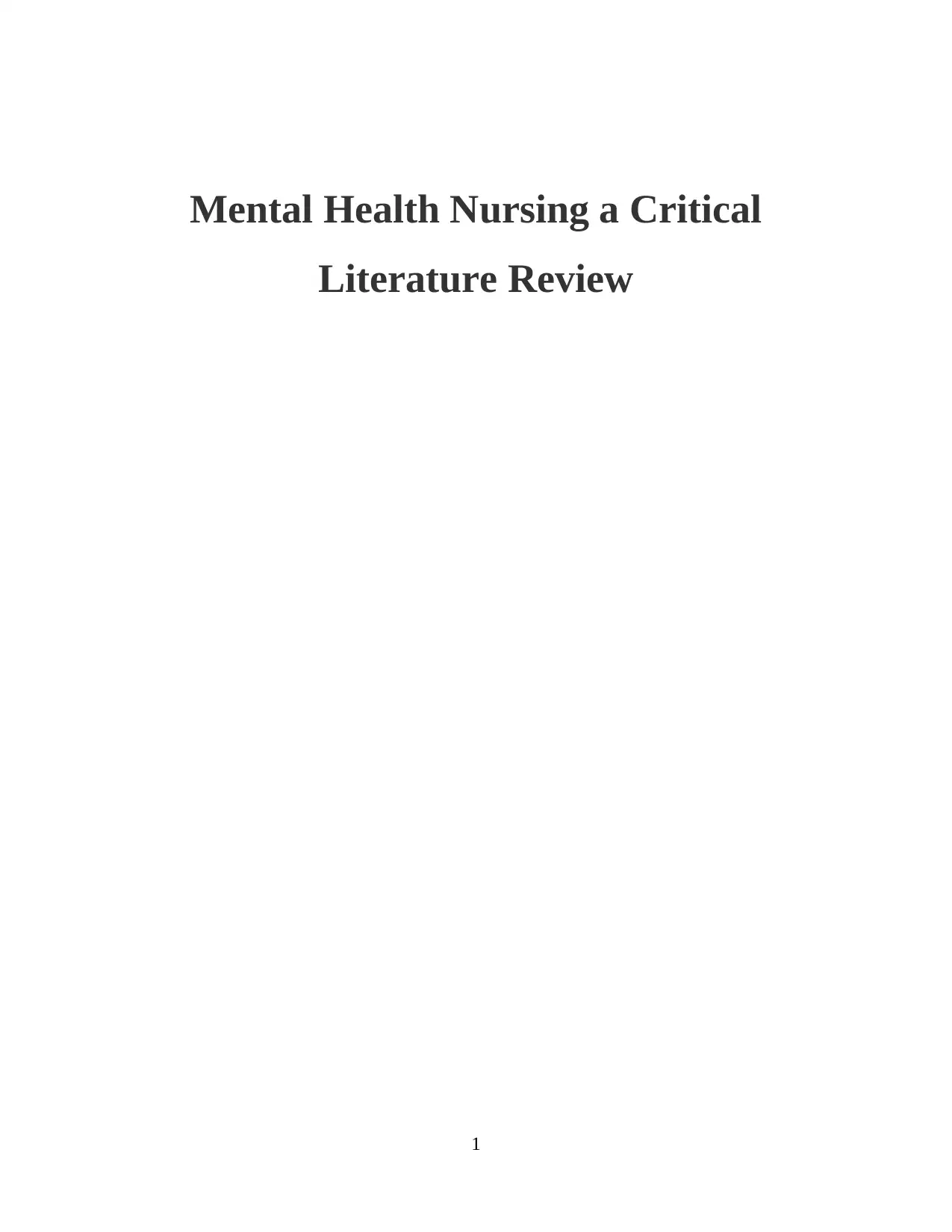
Mental Health Nursing a Critical
Literature Review
1
Literature Review
1
Paraphrase This Document
Need a fresh take? Get an instant paraphrase of this document with our AI Paraphraser
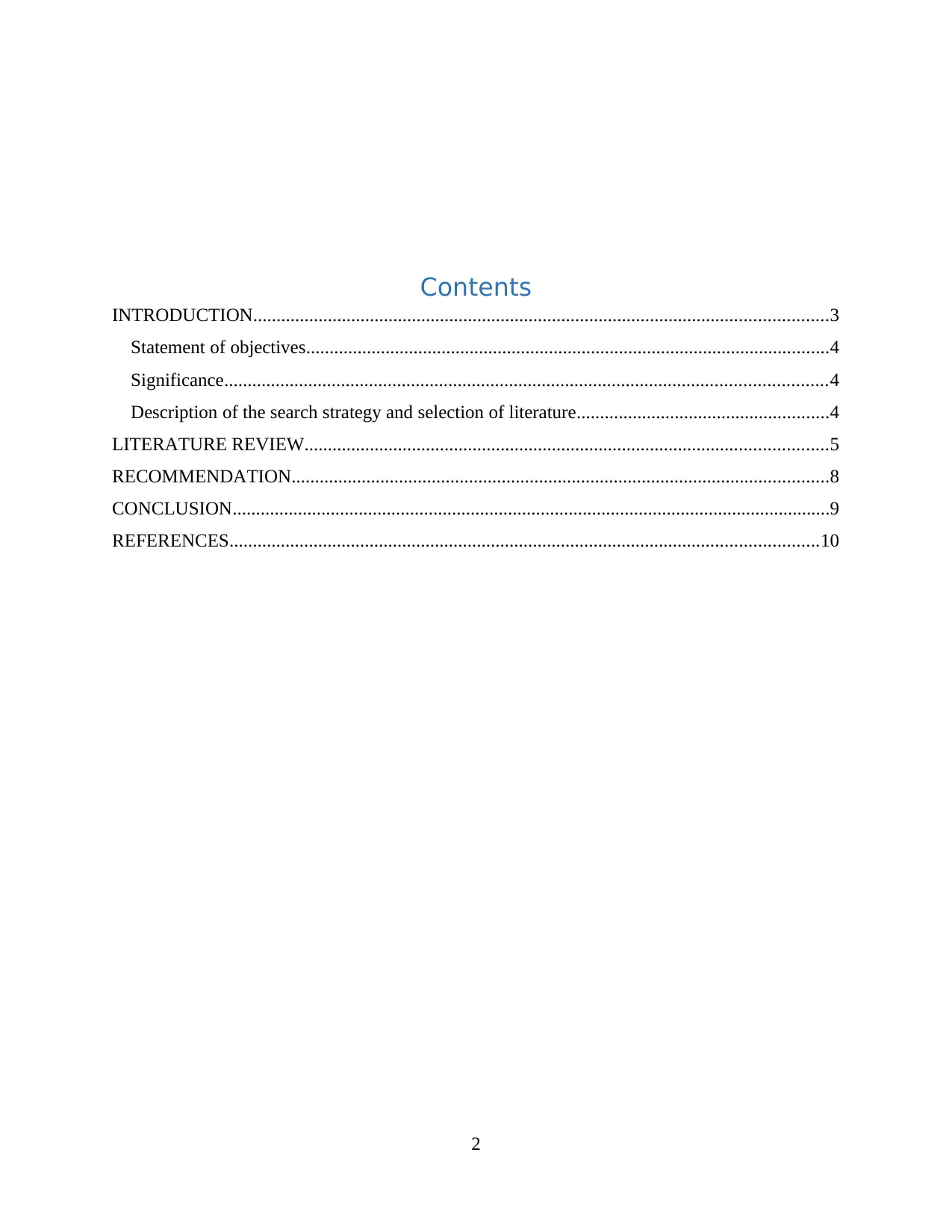
Contents
INTRODUCTION...........................................................................................................................3
Statement of objectives................................................................................................................4
Significance.................................................................................................................................4
Description of the search strategy and selection of literature......................................................4
LITERATURE REVIEW................................................................................................................5
RECOMMENDATION...................................................................................................................8
CONCLUSION................................................................................................................................9
REFERENCES..............................................................................................................................10
2
INTRODUCTION...........................................................................................................................3
Statement of objectives................................................................................................................4
Significance.................................................................................................................................4
Description of the search strategy and selection of literature......................................................4
LITERATURE REVIEW................................................................................................................5
RECOMMENDATION...................................................................................................................8
CONCLUSION................................................................................................................................9
REFERENCES..............................................................................................................................10
2
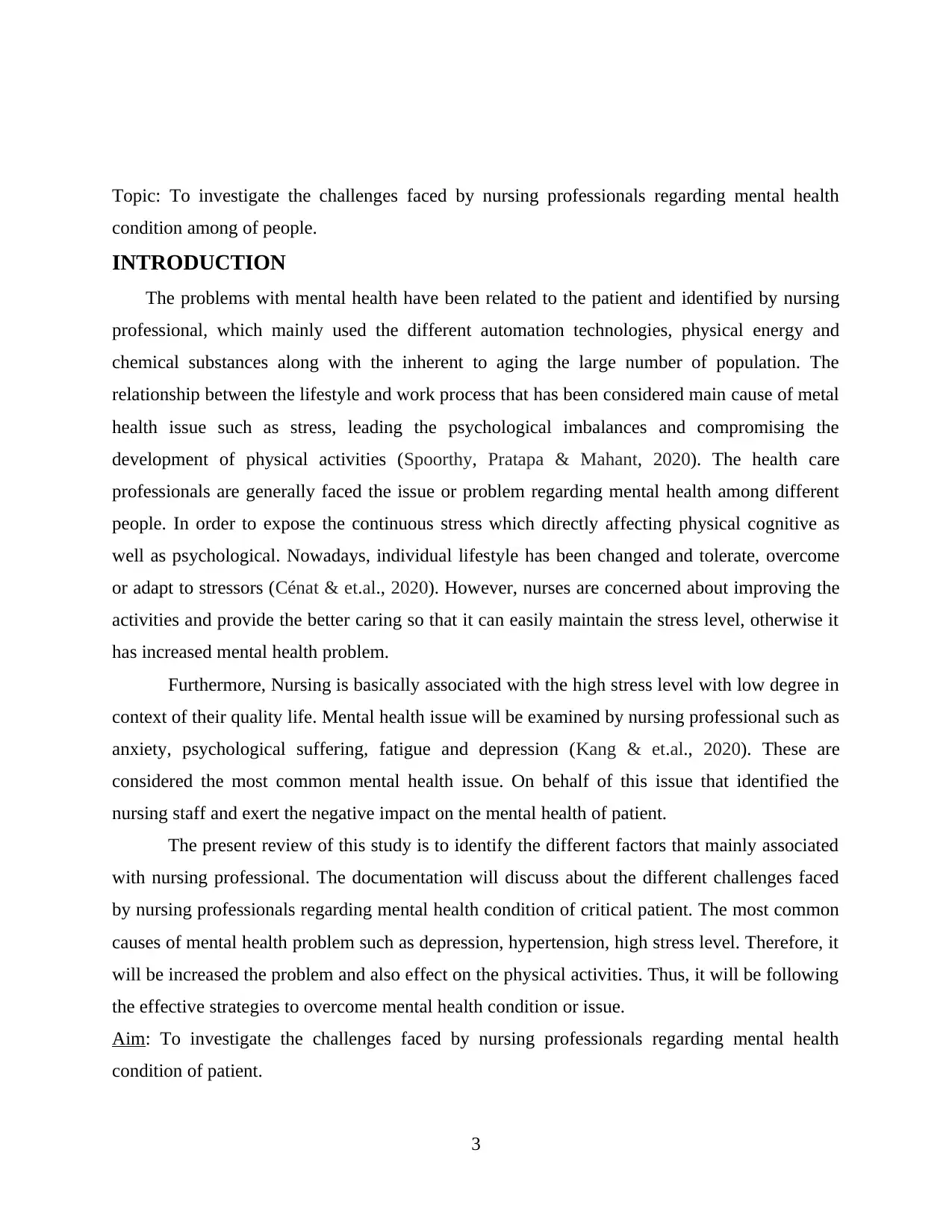
Topic: To investigate the challenges faced by nursing professionals regarding mental health
condition among of people.
INTRODUCTION
The problems with mental health have been related to the patient and identified by nursing
professional, which mainly used the different automation technologies, physical energy and
chemical substances along with the inherent to aging the large number of population. The
relationship between the lifestyle and work process that has been considered main cause of metal
health issue such as stress, leading the psychological imbalances and compromising the
development of physical activities (Spoorthy, Pratapa & Mahant, 2020). The health care
professionals are generally faced the issue or problem regarding mental health among different
people. In order to expose the continuous stress which directly affecting physical cognitive as
well as psychological. Nowadays, individual lifestyle has been changed and tolerate, overcome
or adapt to stressors (Cénat & et.al., 2020). However, nurses are concerned about improving the
activities and provide the better caring so that it can easily maintain the stress level, otherwise it
has increased mental health problem.
Furthermore, Nursing is basically associated with the high stress level with low degree in
context of their quality life. Mental health issue will be examined by nursing professional such as
anxiety, psychological suffering, fatigue and depression (Kang & et.al., 2020). These are
considered the most common mental health issue. On behalf of this issue that identified the
nursing staff and exert the negative impact on the mental health of patient.
The present review of this study is to identify the different factors that mainly associated
with nursing professional. The documentation will discuss about the different challenges faced
by nursing professionals regarding mental health condition of critical patient. The most common
causes of mental health problem such as depression, hypertension, high stress level. Therefore, it
will be increased the problem and also effect on the physical activities. Thus, it will be following
the effective strategies to overcome mental health condition or issue.
Aim: To investigate the challenges faced by nursing professionals regarding mental health
condition of patient.
3
condition among of people.
INTRODUCTION
The problems with mental health have been related to the patient and identified by nursing
professional, which mainly used the different automation technologies, physical energy and
chemical substances along with the inherent to aging the large number of population. The
relationship between the lifestyle and work process that has been considered main cause of metal
health issue such as stress, leading the psychological imbalances and compromising the
development of physical activities (Spoorthy, Pratapa & Mahant, 2020). The health care
professionals are generally faced the issue or problem regarding mental health among different
people. In order to expose the continuous stress which directly affecting physical cognitive as
well as psychological. Nowadays, individual lifestyle has been changed and tolerate, overcome
or adapt to stressors (Cénat & et.al., 2020). However, nurses are concerned about improving the
activities and provide the better caring so that it can easily maintain the stress level, otherwise it
has increased mental health problem.
Furthermore, Nursing is basically associated with the high stress level with low degree in
context of their quality life. Mental health issue will be examined by nursing professional such as
anxiety, psychological suffering, fatigue and depression (Kang & et.al., 2020). These are
considered the most common mental health issue. On behalf of this issue that identified the
nursing staff and exert the negative impact on the mental health of patient.
The present review of this study is to identify the different factors that mainly associated
with nursing professional. The documentation will discuss about the different challenges faced
by nursing professionals regarding mental health condition of critical patient. The most common
causes of mental health problem such as depression, hypertension, high stress level. Therefore, it
will be increased the problem and also effect on the physical activities. Thus, it will be following
the effective strategies to overcome mental health condition or issue.
Aim: To investigate the challenges faced by nursing professionals regarding mental health
condition of patient.
3
⊘ This is a preview!⊘
Do you want full access?
Subscribe today to unlock all pages.

Trusted by 1+ million students worldwide
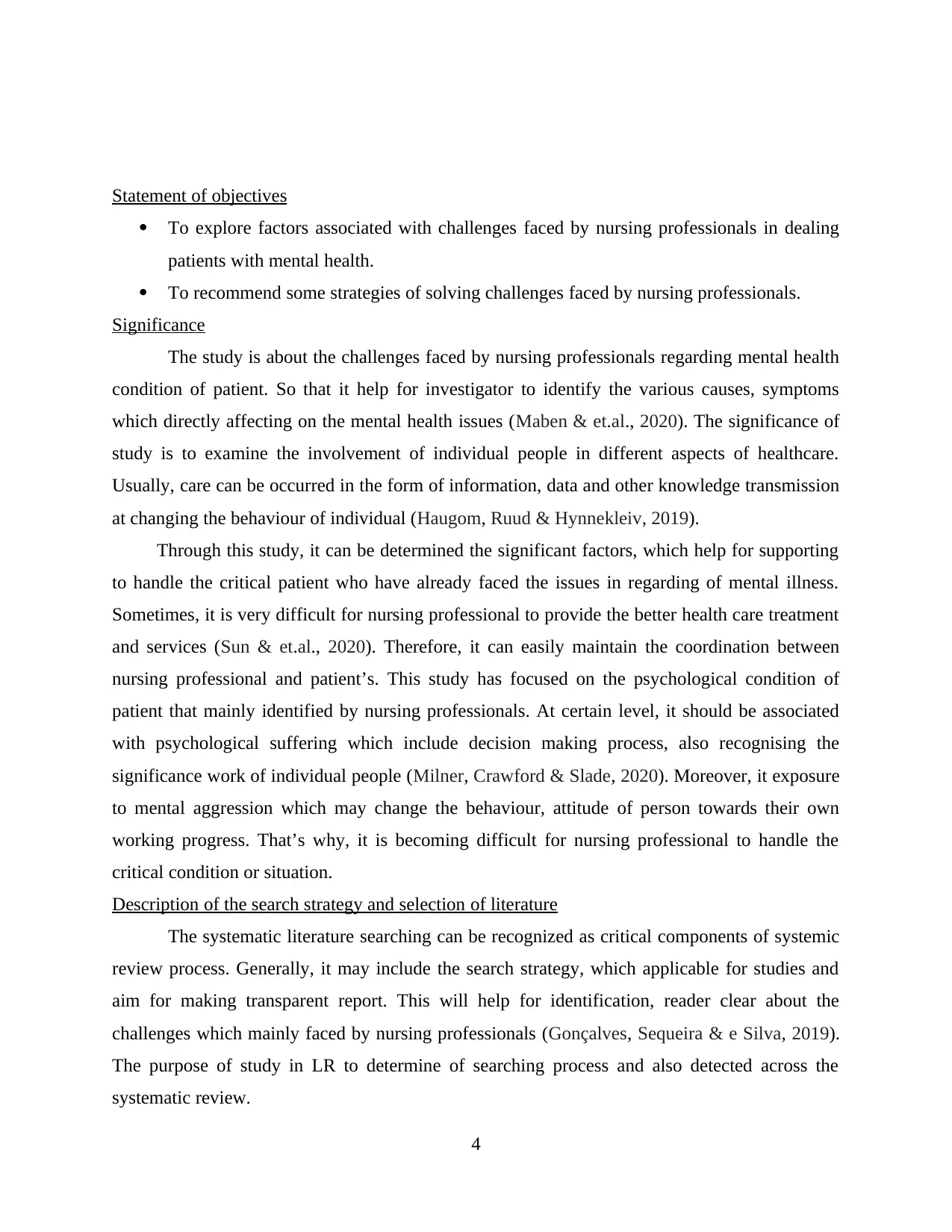
Statement of objectives
To explore factors associated with challenges faced by nursing professionals in dealing
patients with mental health.
To recommend some strategies of solving challenges faced by nursing professionals.
Significance
The study is about the challenges faced by nursing professionals regarding mental health
condition of patient. So that it help for investigator to identify the various causes, symptoms
which directly affecting on the mental health issues (Maben & et.al., 2020). The significance of
study is to examine the involvement of individual people in different aspects of healthcare.
Usually, care can be occurred in the form of information, data and other knowledge transmission
at changing the behaviour of individual (Haugom, Ruud & Hynnekleiv, 2019).
Through this study, it can be determined the significant factors, which help for supporting
to handle the critical patient who have already faced the issues in regarding of mental illness.
Sometimes, it is very difficult for nursing professional to provide the better health care treatment
and services (Sun & et.al., 2020). Therefore, it can easily maintain the coordination between
nursing professional and patient’s. This study has focused on the psychological condition of
patient that mainly identified by nursing professionals. At certain level, it should be associated
with psychological suffering which include decision making process, also recognising the
significance work of individual people (Milner, Crawford & Slade, 2020). Moreover, it exposure
to mental aggression which may change the behaviour, attitude of person towards their own
working progress. That’s why, it is becoming difficult for nursing professional to handle the
critical condition or situation.
Description of the search strategy and selection of literature
The systematic literature searching can be recognized as critical components of systemic
review process. Generally, it may include the search strategy, which applicable for studies and
aim for making transparent report. This will help for identification, reader clear about the
challenges which mainly faced by nursing professionals (Gonçalves, Sequeira & e Silva, 2019).
The purpose of study in LR to determine of searching process and also detected across the
systematic review.
4
To explore factors associated with challenges faced by nursing professionals in dealing
patients with mental health.
To recommend some strategies of solving challenges faced by nursing professionals.
Significance
The study is about the challenges faced by nursing professionals regarding mental health
condition of patient. So that it help for investigator to identify the various causes, symptoms
which directly affecting on the mental health issues (Maben & et.al., 2020). The significance of
study is to examine the involvement of individual people in different aspects of healthcare.
Usually, care can be occurred in the form of information, data and other knowledge transmission
at changing the behaviour of individual (Haugom, Ruud & Hynnekleiv, 2019).
Through this study, it can be determined the significant factors, which help for supporting
to handle the critical patient who have already faced the issues in regarding of mental illness.
Sometimes, it is very difficult for nursing professional to provide the better health care treatment
and services (Sun & et.al., 2020). Therefore, it can easily maintain the coordination between
nursing professional and patient’s. This study has focused on the psychological condition of
patient that mainly identified by nursing professionals. At certain level, it should be associated
with psychological suffering which include decision making process, also recognising the
significance work of individual people (Milner, Crawford & Slade, 2020). Moreover, it exposure
to mental aggression which may change the behaviour, attitude of person towards their own
working progress. That’s why, it is becoming difficult for nursing professional to handle the
critical condition or situation.
Description of the search strategy and selection of literature
The systematic literature searching can be recognized as critical components of systemic
review process. Generally, it may include the search strategy, which applicable for studies and
aim for making transparent report. This will help for identification, reader clear about the
challenges which mainly faced by nursing professionals (Gonçalves, Sequeira & e Silva, 2019).
The purpose of study in LR to determine of searching process and also detected across the
systematic review.
4
Paraphrase This Document
Need a fresh take? Get an instant paraphrase of this document with our AI Paraphraser
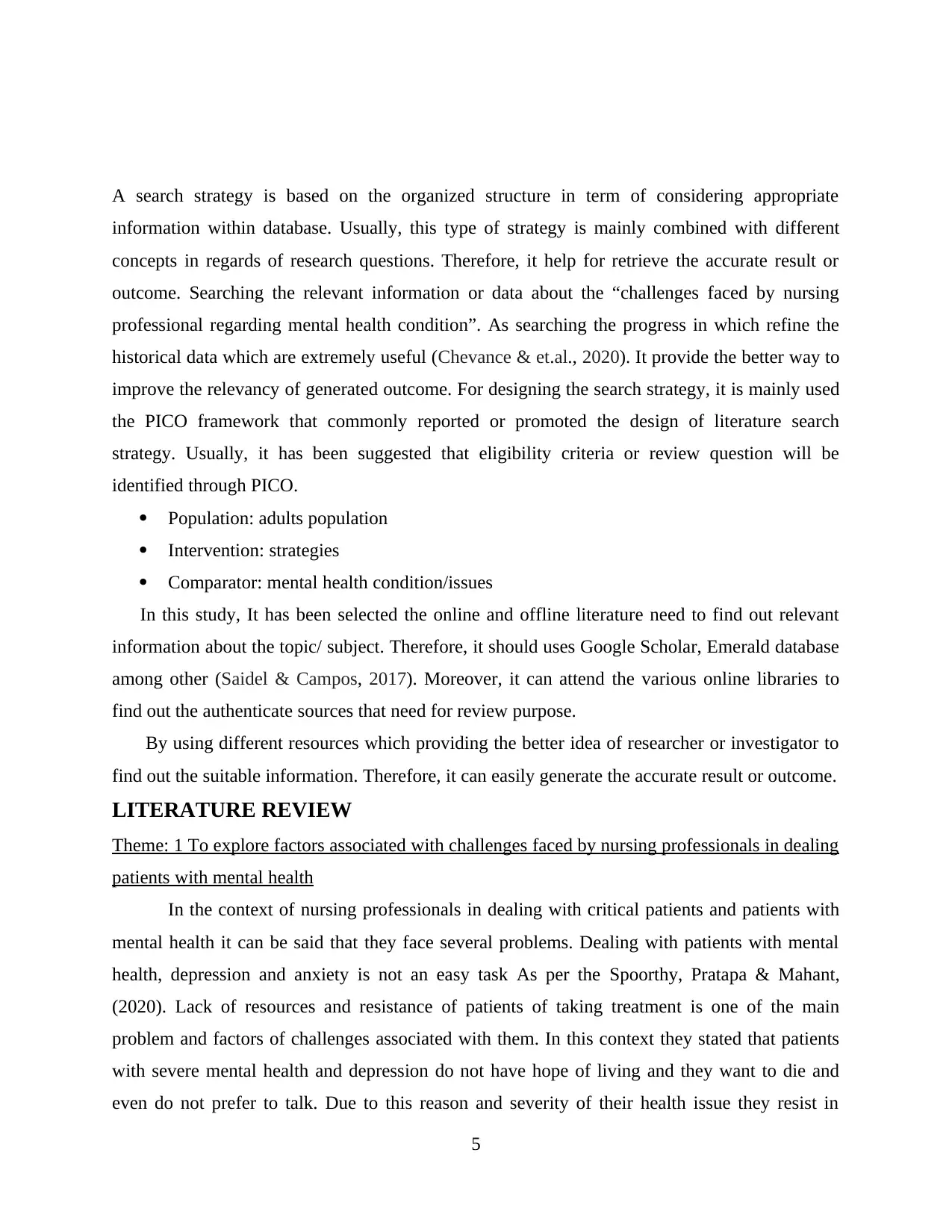
A search strategy is based on the organized structure in term of considering appropriate
information within database. Usually, this type of strategy is mainly combined with different
concepts in regards of research questions. Therefore, it help for retrieve the accurate result or
outcome. Searching the relevant information or data about the “challenges faced by nursing
professional regarding mental health condition”. As searching the progress in which refine the
historical data which are extremely useful (Chevance & et.al., 2020). It provide the better way to
improve the relevancy of generated outcome. For designing the search strategy, it is mainly used
the PICO framework that commonly reported or promoted the design of literature search
strategy. Usually, it has been suggested that eligibility criteria or review question will be
identified through PICO.
Population: adults population
Intervention: strategies
Comparator: mental health condition/issues
In this study, It has been selected the online and offline literature need to find out relevant
information about the topic/ subject. Therefore, it should uses Google Scholar, Emerald database
among other (Saidel & Campos, 2017). Moreover, it can attend the various online libraries to
find out the authenticate sources that need for review purpose.
By using different resources which providing the better idea of researcher or investigator to
find out the suitable information. Therefore, it can easily generate the accurate result or outcome.
LITERATURE REVIEW
Theme: 1 To explore factors associated with challenges faced by nursing professionals in dealing
patients with mental health
In the context of nursing professionals in dealing with critical patients and patients with
mental health it can be said that they face several problems. Dealing with patients with mental
health, depression and anxiety is not an easy task As per the Spoorthy, Pratapa & Mahant,
(2020). Lack of resources and resistance of patients of taking treatment is one of the main
problem and factors of challenges associated with them. In this context they stated that patients
with severe mental health and depression do not have hope of living and they want to die and
even do not prefer to talk. Due to this reason and severity of their health issue they resist in
5
information within database. Usually, this type of strategy is mainly combined with different
concepts in regards of research questions. Therefore, it help for retrieve the accurate result or
outcome. Searching the relevant information or data about the “challenges faced by nursing
professional regarding mental health condition”. As searching the progress in which refine the
historical data which are extremely useful (Chevance & et.al., 2020). It provide the better way to
improve the relevancy of generated outcome. For designing the search strategy, it is mainly used
the PICO framework that commonly reported or promoted the design of literature search
strategy. Usually, it has been suggested that eligibility criteria or review question will be
identified through PICO.
Population: adults population
Intervention: strategies
Comparator: mental health condition/issues
In this study, It has been selected the online and offline literature need to find out relevant
information about the topic/ subject. Therefore, it should uses Google Scholar, Emerald database
among other (Saidel & Campos, 2017). Moreover, it can attend the various online libraries to
find out the authenticate sources that need for review purpose.
By using different resources which providing the better idea of researcher or investigator to
find out the suitable information. Therefore, it can easily generate the accurate result or outcome.
LITERATURE REVIEW
Theme: 1 To explore factors associated with challenges faced by nursing professionals in dealing
patients with mental health
In the context of nursing professionals in dealing with critical patients and patients with
mental health it can be said that they face several problems. Dealing with patients with mental
health, depression and anxiety is not an easy task As per the Spoorthy, Pratapa & Mahant,
(2020). Lack of resources and resistance of patients of taking treatment is one of the main
problem and factors of challenges associated with them. In this context they stated that patients
with severe mental health and depression do not have hope of living and they want to die and
even do not prefer to talk. Due to this reason and severity of their health issue they resist in
5
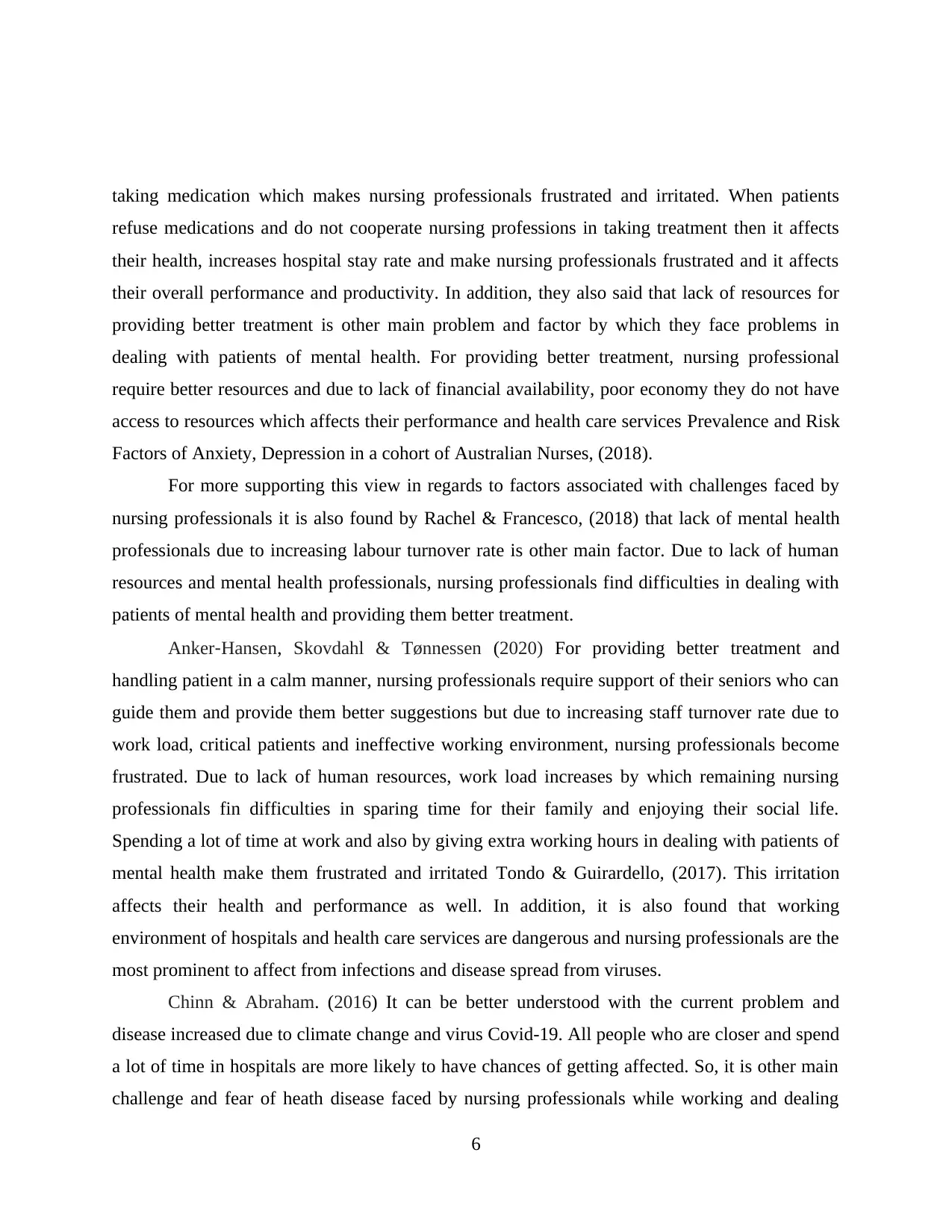
taking medication which makes nursing professionals frustrated and irritated. When patients
refuse medications and do not cooperate nursing professions in taking treatment then it affects
their health, increases hospital stay rate and make nursing professionals frustrated and it affects
their overall performance and productivity. In addition, they also said that lack of resources for
providing better treatment is other main problem and factor by which they face problems in
dealing with patients of mental health. For providing better treatment, nursing professional
require better resources and due to lack of financial availability, poor economy they do not have
access to resources which affects their performance and health care services Prevalence and Risk
Factors of Anxiety, Depression in a cohort of Australian Nurses, (2018).
For more supporting this view in regards to factors associated with challenges faced by
nursing professionals it is also found by Rachel & Francesco, (2018) that lack of mental health
professionals due to increasing labour turnover rate is other main factor. Due to lack of human
resources and mental health professionals, nursing professionals find difficulties in dealing with
patients of mental health and providing them better treatment.
Anker‐Hansen, Skovdahl & Tønnessen (2020) For providing better treatment and
handling patient in a calm manner, nursing professionals require support of their seniors who can
guide them and provide them better suggestions but due to increasing staff turnover rate due to
work load, critical patients and ineffective working environment, nursing professionals become
frustrated. Due to lack of human resources, work load increases by which remaining nursing
professionals fin difficulties in sparing time for their family and enjoying their social life.
Spending a lot of time at work and also by giving extra working hours in dealing with patients of
mental health make them frustrated and irritated Tondo & Guirardello, (2017). This irritation
affects their health and performance as well. In addition, it is also found that working
environment of hospitals and health care services are dangerous and nursing professionals are the
most prominent to affect from infections and disease spread from viruses.
Chinn & Abraham. (2016) It can be better understood with the current problem and
disease increased due to climate change and virus Covid-19. All people who are closer and spend
a lot of time in hospitals are more likely to have chances of getting affected. So, it is other main
challenge and fear of heath disease faced by nursing professionals while working and dealing
6
refuse medications and do not cooperate nursing professions in taking treatment then it affects
their health, increases hospital stay rate and make nursing professionals frustrated and it affects
their overall performance and productivity. In addition, they also said that lack of resources for
providing better treatment is other main problem and factor by which they face problems in
dealing with patients of mental health. For providing better treatment, nursing professional
require better resources and due to lack of financial availability, poor economy they do not have
access to resources which affects their performance and health care services Prevalence and Risk
Factors of Anxiety, Depression in a cohort of Australian Nurses, (2018).
For more supporting this view in regards to factors associated with challenges faced by
nursing professionals it is also found by Rachel & Francesco, (2018) that lack of mental health
professionals due to increasing labour turnover rate is other main factor. Due to lack of human
resources and mental health professionals, nursing professionals find difficulties in dealing with
patients of mental health and providing them better treatment.
Anker‐Hansen, Skovdahl & Tønnessen (2020) For providing better treatment and
handling patient in a calm manner, nursing professionals require support of their seniors who can
guide them and provide them better suggestions but due to increasing staff turnover rate due to
work load, critical patients and ineffective working environment, nursing professionals become
frustrated. Due to lack of human resources, work load increases by which remaining nursing
professionals fin difficulties in sparing time for their family and enjoying their social life.
Spending a lot of time at work and also by giving extra working hours in dealing with patients of
mental health make them frustrated and irritated Tondo & Guirardello, (2017). This irritation
affects their health and performance as well. In addition, it is also found that working
environment of hospitals and health care services are dangerous and nursing professionals are the
most prominent to affect from infections and disease spread from viruses.
Chinn & Abraham. (2016) It can be better understood with the current problem and
disease increased due to climate change and virus Covid-19. All people who are closer and spend
a lot of time in hospitals are more likely to have chances of getting affected. So, it is other main
challenge and fear of heath disease faced by nursing professionals while working and dealing
6
⊘ This is a preview!⊘
Do you want full access?
Subscribe today to unlock all pages.

Trusted by 1+ million students worldwide
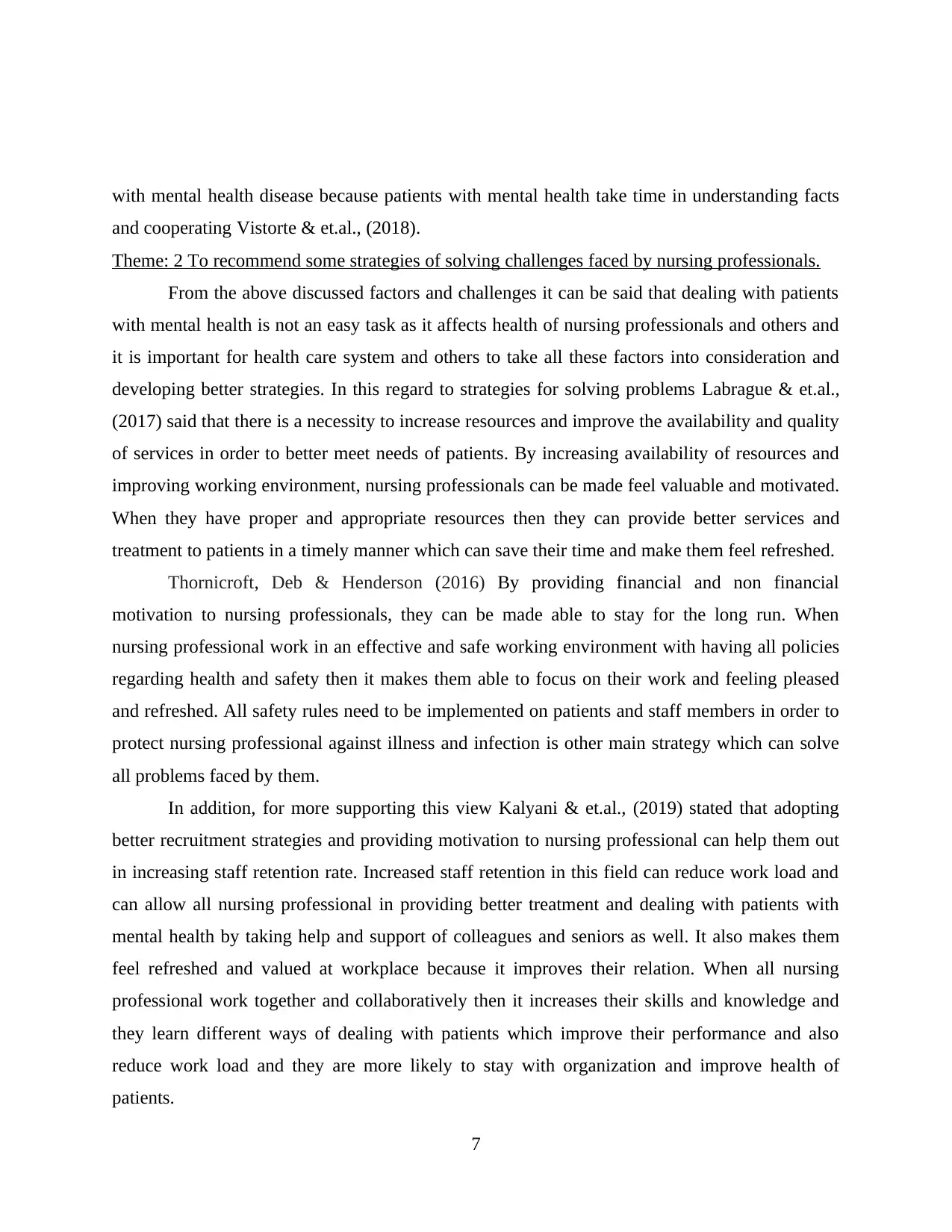
with mental health disease because patients with mental health take time in understanding facts
and cooperating Vistorte & et.al., (2018).
Theme: 2 To recommend some strategies of solving challenges faced by nursing professionals.
From the above discussed factors and challenges it can be said that dealing with patients
with mental health is not an easy task as it affects health of nursing professionals and others and
it is important for health care system and others to take all these factors into consideration and
developing better strategies. In this regard to strategies for solving problems Labrague & et.al.,
(2017) said that there is a necessity to increase resources and improve the availability and quality
of services in order to better meet needs of patients. By increasing availability of resources and
improving working environment, nursing professionals can be made feel valuable and motivated.
When they have proper and appropriate resources then they can provide better services and
treatment to patients in a timely manner which can save their time and make them feel refreshed.
Thornicroft, Deb & Henderson (2016) By providing financial and non financial
motivation to nursing professionals, they can be made able to stay for the long run. When
nursing professional work in an effective and safe working environment with having all policies
regarding health and safety then it makes them able to focus on their work and feeling pleased
and refreshed. All safety rules need to be implemented on patients and staff members in order to
protect nursing professional against illness and infection is other main strategy which can solve
all problems faced by them.
In addition, for more supporting this view Kalyani & et.al., (2019) stated that adopting
better recruitment strategies and providing motivation to nursing professional can help them out
in increasing staff retention rate. Increased staff retention in this field can reduce work load and
can allow all nursing professional in providing better treatment and dealing with patients with
mental health by taking help and support of colleagues and seniors as well. It also makes them
feel refreshed and valued at workplace because it improves their relation. When all nursing
professional work together and collaboratively then it increases their skills and knowledge and
they learn different ways of dealing with patients which improve their performance and also
reduce work load and they are more likely to stay with organization and improve health of
patients.
7
and cooperating Vistorte & et.al., (2018).
Theme: 2 To recommend some strategies of solving challenges faced by nursing professionals.
From the above discussed factors and challenges it can be said that dealing with patients
with mental health is not an easy task as it affects health of nursing professionals and others and
it is important for health care system and others to take all these factors into consideration and
developing better strategies. In this regard to strategies for solving problems Labrague & et.al.,
(2017) said that there is a necessity to increase resources and improve the availability and quality
of services in order to better meet needs of patients. By increasing availability of resources and
improving working environment, nursing professionals can be made feel valuable and motivated.
When they have proper and appropriate resources then they can provide better services and
treatment to patients in a timely manner which can save their time and make them feel refreshed.
Thornicroft, Deb & Henderson (2016) By providing financial and non financial
motivation to nursing professionals, they can be made able to stay for the long run. When
nursing professional work in an effective and safe working environment with having all policies
regarding health and safety then it makes them able to focus on their work and feeling pleased
and refreshed. All safety rules need to be implemented on patients and staff members in order to
protect nursing professional against illness and infection is other main strategy which can solve
all problems faced by them.
In addition, for more supporting this view Kalyani & et.al., (2019) stated that adopting
better recruitment strategies and providing motivation to nursing professional can help them out
in increasing staff retention rate. Increased staff retention in this field can reduce work load and
can allow all nursing professional in providing better treatment and dealing with patients with
mental health by taking help and support of colleagues and seniors as well. It also makes them
feel refreshed and valued at workplace because it improves their relation. When all nursing
professional work together and collaboratively then it increases their skills and knowledge and
they learn different ways of dealing with patients which improve their performance and also
reduce work load and they are more likely to stay with organization and improve health of
patients.
7
Paraphrase This Document
Need a fresh take? Get an instant paraphrase of this document with our AI Paraphraser
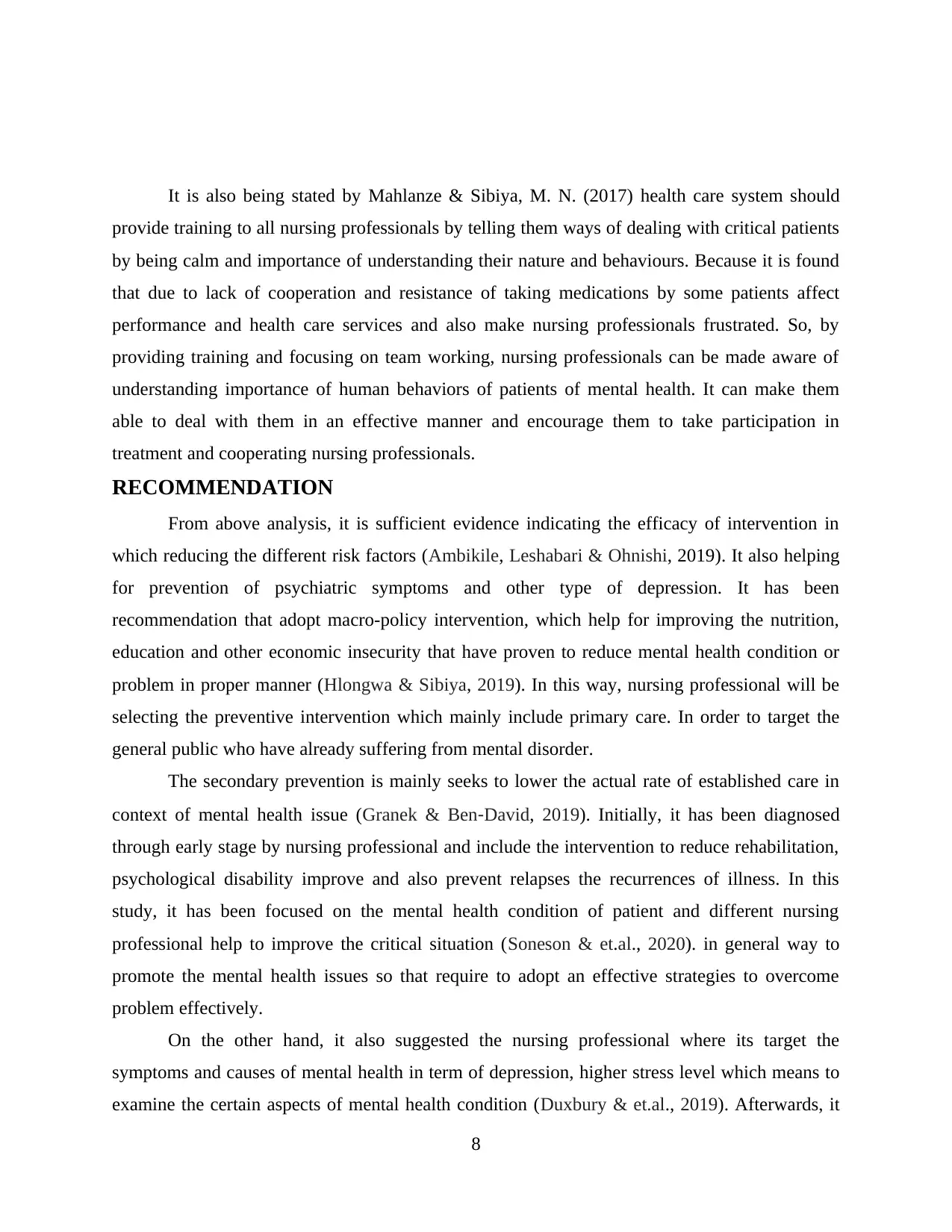
It is also being stated by Mahlanze & Sibiya, M. N. (2017) health care system should
provide training to all nursing professionals by telling them ways of dealing with critical patients
by being calm and importance of understanding their nature and behaviours. Because it is found
that due to lack of cooperation and resistance of taking medications by some patients affect
performance and health care services and also make nursing professionals frustrated. So, by
providing training and focusing on team working, nursing professionals can be made aware of
understanding importance of human behaviors of patients of mental health. It can make them
able to deal with them in an effective manner and encourage them to take participation in
treatment and cooperating nursing professionals.
RECOMMENDATION
From above analysis, it is sufficient evidence indicating the efficacy of intervention in
which reducing the different risk factors (Ambikile, Leshabari & Ohnishi, 2019). It also helping
for prevention of psychiatric symptoms and other type of depression. It has been
recommendation that adopt macro-policy intervention, which help for improving the nutrition,
education and other economic insecurity that have proven to reduce mental health condition or
problem in proper manner (Hlongwa & Sibiya, 2019). In this way, nursing professional will be
selecting the preventive intervention which mainly include primary care. In order to target the
general public who have already suffering from mental disorder.
The secondary prevention is mainly seeks to lower the actual rate of established care in
context of mental health issue (Granek & Ben‐David, 2019). Initially, it has been diagnosed
through early stage by nursing professional and include the intervention to reduce rehabilitation,
psychological disability improve and also prevent relapses the recurrences of illness. In this
study, it has been focused on the mental health condition of patient and different nursing
professional help to improve the critical situation (Soneson & et.al., 2020). in general way to
promote the mental health issues so that require to adopt an effective strategies to overcome
problem effectively.
On the other hand, it also suggested the nursing professional where its target the
symptoms and causes of mental health in term of depression, higher stress level which means to
examine the certain aspects of mental health condition (Duxbury & et.al., 2019). Afterwards, it
8
provide training to all nursing professionals by telling them ways of dealing with critical patients
by being calm and importance of understanding their nature and behaviours. Because it is found
that due to lack of cooperation and resistance of taking medications by some patients affect
performance and health care services and also make nursing professionals frustrated. So, by
providing training and focusing on team working, nursing professionals can be made aware of
understanding importance of human behaviors of patients of mental health. It can make them
able to deal with them in an effective manner and encourage them to take participation in
treatment and cooperating nursing professionals.
RECOMMENDATION
From above analysis, it is sufficient evidence indicating the efficacy of intervention in
which reducing the different risk factors (Ambikile, Leshabari & Ohnishi, 2019). It also helping
for prevention of psychiatric symptoms and other type of depression. It has been
recommendation that adopt macro-policy intervention, which help for improving the nutrition,
education and other economic insecurity that have proven to reduce mental health condition or
problem in proper manner (Hlongwa & Sibiya, 2019). In this way, nursing professional will be
selecting the preventive intervention which mainly include primary care. In order to target the
general public who have already suffering from mental disorder.
The secondary prevention is mainly seeks to lower the actual rate of established care in
context of mental health issue (Granek & Ben‐David, 2019). Initially, it has been diagnosed
through early stage by nursing professional and include the intervention to reduce rehabilitation,
psychological disability improve and also prevent relapses the recurrences of illness. In this
study, it has been focused on the mental health condition of patient and different nursing
professional help to improve the critical situation (Soneson & et.al., 2020). in general way to
promote the mental health issues so that require to adopt an effective strategies to overcome
problem effectively.
On the other hand, it also suggested the nursing professional where its target the
symptoms and causes of mental health in term of depression, higher stress level which means to
examine the certain aspects of mental health condition (Duxbury & et.al., 2019). Afterwards, it
8
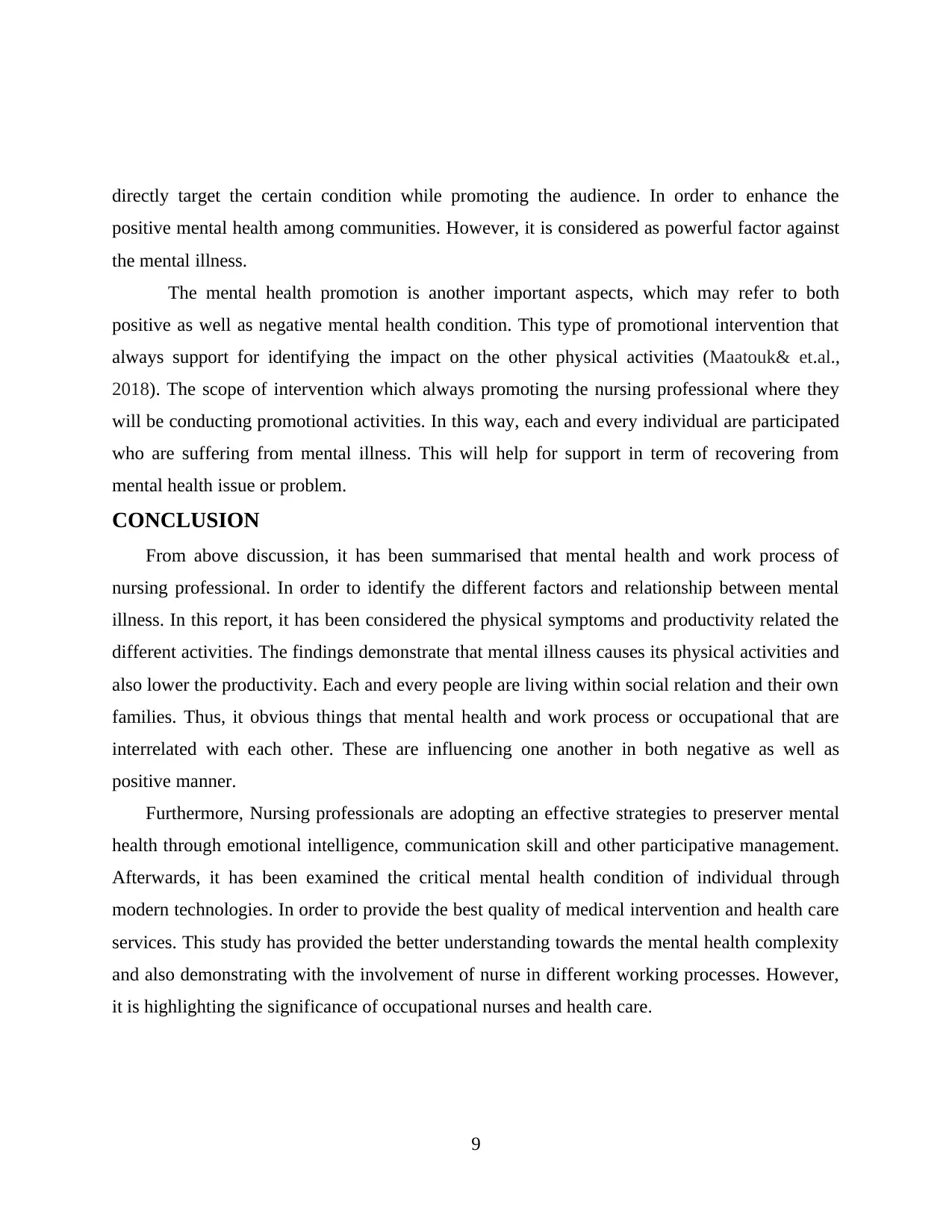
directly target the certain condition while promoting the audience. In order to enhance the
positive mental health among communities. However, it is considered as powerful factor against
the mental illness.
The mental health promotion is another important aspects, which may refer to both
positive as well as negative mental health condition. This type of promotional intervention that
always support for identifying the impact on the other physical activities (Maatouk& et.al.,
2018). The scope of intervention which always promoting the nursing professional where they
will be conducting promotional activities. In this way, each and every individual are participated
who are suffering from mental illness. This will help for support in term of recovering from
mental health issue or problem.
CONCLUSION
From above discussion, it has been summarised that mental health and work process of
nursing professional. In order to identify the different factors and relationship between mental
illness. In this report, it has been considered the physical symptoms and productivity related the
different activities. The findings demonstrate that mental illness causes its physical activities and
also lower the productivity. Each and every people are living within social relation and their own
families. Thus, it obvious things that mental health and work process or occupational that are
interrelated with each other. These are influencing one another in both negative as well as
positive manner.
Furthermore, Nursing professionals are adopting an effective strategies to preserver mental
health through emotional intelligence, communication skill and other participative management.
Afterwards, it has been examined the critical mental health condition of individual through
modern technologies. In order to provide the best quality of medical intervention and health care
services. This study has provided the better understanding towards the mental health complexity
and also demonstrating with the involvement of nurse in different working processes. However,
it is highlighting the significance of occupational nurses and health care.
9
positive mental health among communities. However, it is considered as powerful factor against
the mental illness.
The mental health promotion is another important aspects, which may refer to both
positive as well as negative mental health condition. This type of promotional intervention that
always support for identifying the impact on the other physical activities (Maatouk& et.al.,
2018). The scope of intervention which always promoting the nursing professional where they
will be conducting promotional activities. In this way, each and every individual are participated
who are suffering from mental illness. This will help for support in term of recovering from
mental health issue or problem.
CONCLUSION
From above discussion, it has been summarised that mental health and work process of
nursing professional. In order to identify the different factors and relationship between mental
illness. In this report, it has been considered the physical symptoms and productivity related the
different activities. The findings demonstrate that mental illness causes its physical activities and
also lower the productivity. Each and every people are living within social relation and their own
families. Thus, it obvious things that mental health and work process or occupational that are
interrelated with each other. These are influencing one another in both negative as well as
positive manner.
Furthermore, Nursing professionals are adopting an effective strategies to preserver mental
health through emotional intelligence, communication skill and other participative management.
Afterwards, it has been examined the critical mental health condition of individual through
modern technologies. In order to provide the best quality of medical intervention and health care
services. This study has provided the better understanding towards the mental health complexity
and also demonstrating with the involvement of nurse in different working processes. However,
it is highlighting the significance of occupational nurses and health care.
9
⊘ This is a preview!⊘
Do you want full access?
Subscribe today to unlock all pages.

Trusted by 1+ million students worldwide
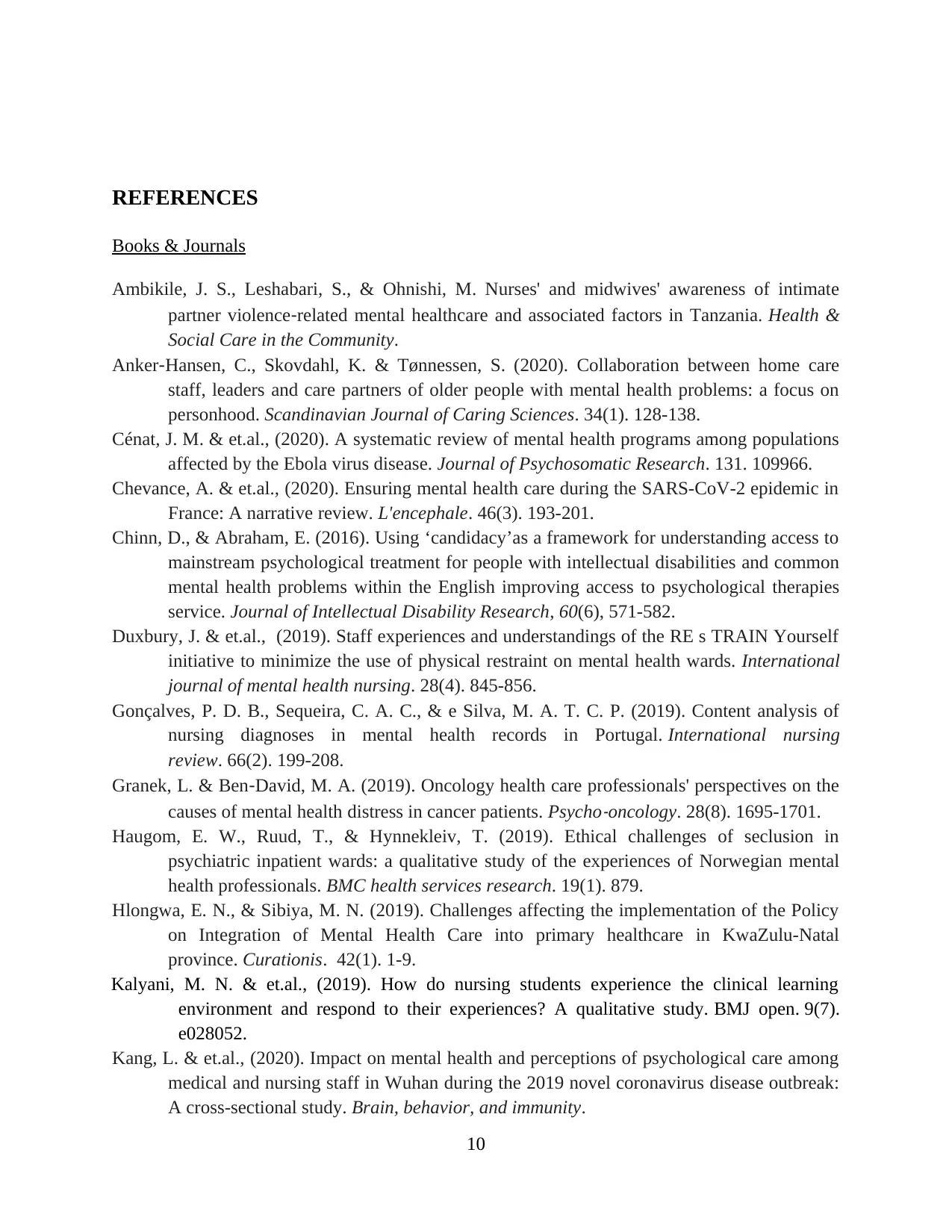
REFERENCES
Books & Journals
Ambikile, J. S., Leshabari, S., & Ohnishi, M. Nurses' and midwives' awareness of intimate
partner violence‐related mental healthcare and associated factors in Tanzania. Health &
Social Care in the Community.
Anker‐Hansen, C., Skovdahl, K. & Tønnessen, S. (2020). Collaboration between home care
staff, leaders and care partners of older people with mental health problems: a focus on
personhood. Scandinavian Journal of Caring Sciences. 34(1). 128-138.
Cénat, J. M. & et.al., (2020). A systematic review of mental health programs among populations
affected by the Ebola virus disease. Journal of Psychosomatic Research. 131. 109966.
Chevance, A. & et.al., (2020). Ensuring mental health care during the SARS-CoV-2 epidemic in
France: A narrative review. L'encephale. 46(3). 193-201.
Chinn, D., & Abraham, E. (2016). Using ‘candidacy’as a framework for understanding access to
mainstream psychological treatment for people with intellectual disabilities and common
mental health problems within the English improving access to psychological therapies
service. Journal of Intellectual Disability Research, 60(6), 571-582.
Duxbury, J. & et.al., (2019). Staff experiences and understandings of the RE s TRAIN Yourself
initiative to minimize the use of physical restraint on mental health wards. International
journal of mental health nursing. 28(4). 845-856.
Gonçalves, P. D. B., Sequeira, C. A. C., & e Silva, M. A. T. C. P. (2019). Content analysis of
nursing diagnoses in mental health records in Portugal. International nursing
review. 66(2). 199-208.
Granek, L. & Ben‐David, M. A. (2019). Oncology health care professionals' perspectives on the
causes of mental health distress in cancer patients. Psycho
‐oncology. 28(8). 1695-1701.
Haugom, E. W., Ruud, T., & Hynnekleiv, T. (2019). Ethical challenges of seclusion in
psychiatric inpatient wards: a qualitative study of the experiences of Norwegian mental
health professionals. BMC health services research. 19(1). 879.
Hlongwa, E. N., & Sibiya, M. N. (2019). Challenges affecting the implementation of the Policy
on Integration of Mental Health Care into primary healthcare in KwaZulu-Natal
province. Curationis. 42(1). 1-9.
Kalyani, M. N. & et.al., (2019). How do nursing students experience the clinical learning
environment and respond to their experiences? A qualitative study. BMJ open. 9(7).
e028052.
Kang, L. & et.al., (2020). Impact on mental health and perceptions of psychological care among
medical and nursing staff in Wuhan during the 2019 novel coronavirus disease outbreak:
A cross-sectional study. Brain, behavior, and immunity.
10
Books & Journals
Ambikile, J. S., Leshabari, S., & Ohnishi, M. Nurses' and midwives' awareness of intimate
partner violence‐related mental healthcare and associated factors in Tanzania. Health &
Social Care in the Community.
Anker‐Hansen, C., Skovdahl, K. & Tønnessen, S. (2020). Collaboration between home care
staff, leaders and care partners of older people with mental health problems: a focus on
personhood. Scandinavian Journal of Caring Sciences. 34(1). 128-138.
Cénat, J. M. & et.al., (2020). A systematic review of mental health programs among populations
affected by the Ebola virus disease. Journal of Psychosomatic Research. 131. 109966.
Chevance, A. & et.al., (2020). Ensuring mental health care during the SARS-CoV-2 epidemic in
France: A narrative review. L'encephale. 46(3). 193-201.
Chinn, D., & Abraham, E. (2016). Using ‘candidacy’as a framework for understanding access to
mainstream psychological treatment for people with intellectual disabilities and common
mental health problems within the English improving access to psychological therapies
service. Journal of Intellectual Disability Research, 60(6), 571-582.
Duxbury, J. & et.al., (2019). Staff experiences and understandings of the RE s TRAIN Yourself
initiative to minimize the use of physical restraint on mental health wards. International
journal of mental health nursing. 28(4). 845-856.
Gonçalves, P. D. B., Sequeira, C. A. C., & e Silva, M. A. T. C. P. (2019). Content analysis of
nursing diagnoses in mental health records in Portugal. International nursing
review. 66(2). 199-208.
Granek, L. & Ben‐David, M. A. (2019). Oncology health care professionals' perspectives on the
causes of mental health distress in cancer patients. Psycho
‐oncology. 28(8). 1695-1701.
Haugom, E. W., Ruud, T., & Hynnekleiv, T. (2019). Ethical challenges of seclusion in
psychiatric inpatient wards: a qualitative study of the experiences of Norwegian mental
health professionals. BMC health services research. 19(1). 879.
Hlongwa, E. N., & Sibiya, M. N. (2019). Challenges affecting the implementation of the Policy
on Integration of Mental Health Care into primary healthcare in KwaZulu-Natal
province. Curationis. 42(1). 1-9.
Kalyani, M. N. & et.al., (2019). How do nursing students experience the clinical learning
environment and respond to their experiences? A qualitative study. BMJ open. 9(7).
e028052.
Kang, L. & et.al., (2020). Impact on mental health and perceptions of psychological care among
medical and nursing staff in Wuhan during the 2019 novel coronavirus disease outbreak:
A cross-sectional study. Brain, behavior, and immunity.
10
Paraphrase This Document
Need a fresh take? Get an instant paraphrase of this document with our AI Paraphraser
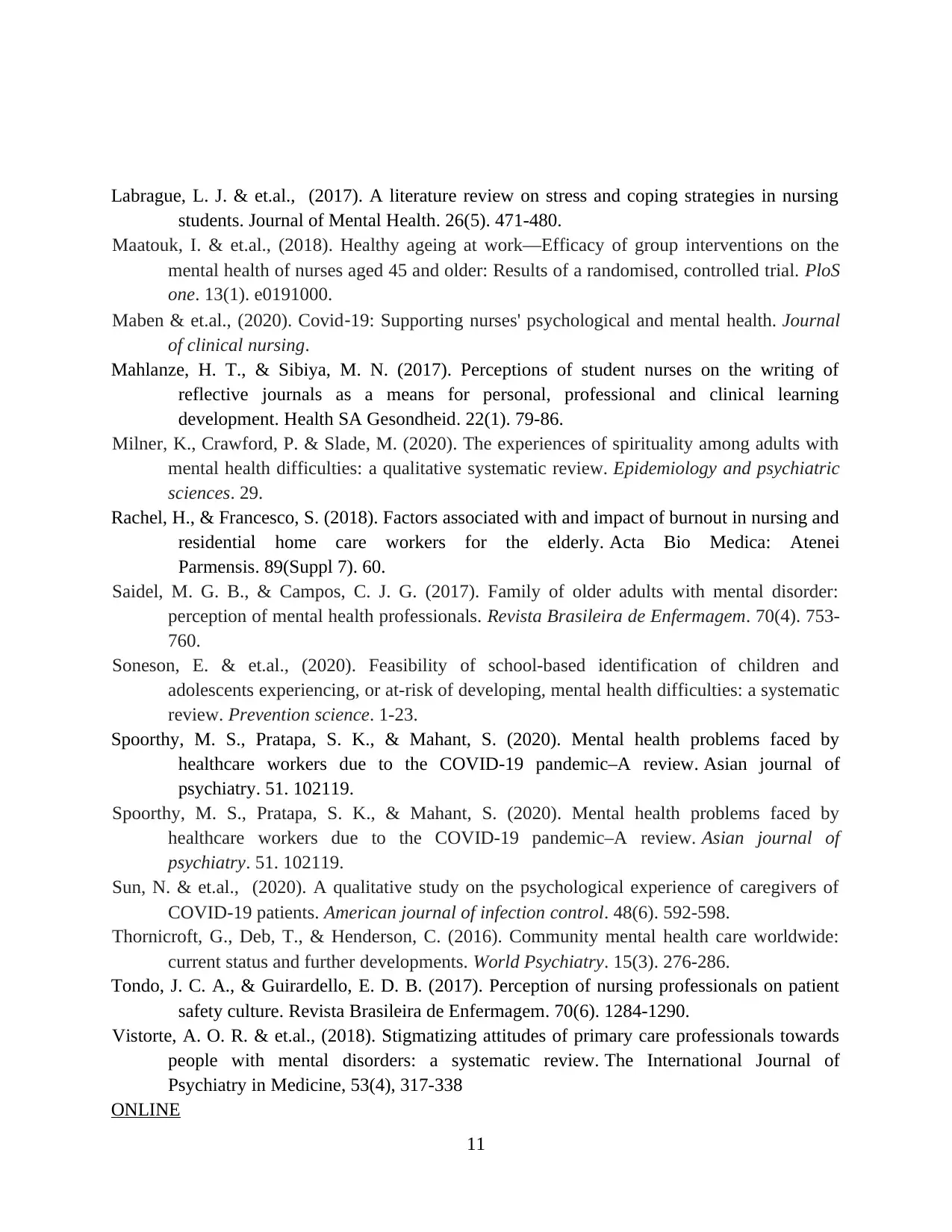
Labrague, L. J. & et.al., (2017). A literature review on stress and coping strategies in nursing
students. Journal of Mental Health. 26(5). 471-480.
Maatouk, I. & et.al., (2018). Healthy ageing at work—Efficacy of group interventions on the
mental health of nurses aged 45 and older: Results of a randomised, controlled trial. PloS
one. 13(1). e0191000.
Maben & et.al., (2020). Covid‐19: Supporting nurses' psychological and mental health. Journal
of clinical nursing.
Mahlanze, H. T., & Sibiya, M. N. (2017). Perceptions of student nurses on the writing of
reflective journals as a means for personal, professional and clinical learning
development. Health SA Gesondheid. 22(1). 79-86.
Milner, K., Crawford, P. & Slade, M. (2020). The experiences of spirituality among adults with
mental health difficulties: a qualitative systematic review. Epidemiology and psychiatric
sciences. 29.
Rachel, H., & Francesco, S. (2018). Factors associated with and impact of burnout in nursing and
residential home care workers for the elderly. Acta Bio Medica: Atenei
Parmensis. 89(Suppl 7). 60.
Saidel, M. G. B., & Campos, C. J. G. (2017). Family of older adults with mental disorder:
perception of mental health professionals. Revista Brasileira de Enfermagem. 70(4). 753-
760.
Soneson, E. & et.al., (2020). Feasibility of school-based identification of children and
adolescents experiencing, or at-risk of developing, mental health difficulties: a systematic
review. Prevention science. 1-23.
Spoorthy, M. S., Pratapa, S. K., & Mahant, S. (2020). Mental health problems faced by
healthcare workers due to the COVID-19 pandemic–A review. Asian journal of
psychiatry. 51. 102119.
Spoorthy, M. S., Pratapa, S. K., & Mahant, S. (2020). Mental health problems faced by
healthcare workers due to the COVID-19 pandemic–A review. Asian journal of
psychiatry. 51. 102119.
Sun, N. & et.al., (2020). A qualitative study on the psychological experience of caregivers of
COVID-19 patients. American journal of infection control. 48(6). 592-598.
Thornicroft, G., Deb, T., & Henderson, C. (2016). Community mental health care worldwide:
current status and further developments. World Psychiatry. 15(3). 276-286.
Tondo, J. C. A., & Guirardello, E. D. B. (2017). Perception of nursing professionals on patient
safety culture. Revista Brasileira de Enfermagem. 70(6). 1284-1290.
Vistorte, A. O. R. & et.al., (2018). Stigmatizing attitudes of primary care professionals towards
people with mental disorders: a systematic review. The International Journal of
Psychiatry in Medicine, 53(4), 317-338
ONLINE
11
students. Journal of Mental Health. 26(5). 471-480.
Maatouk, I. & et.al., (2018). Healthy ageing at work—Efficacy of group interventions on the
mental health of nurses aged 45 and older: Results of a randomised, controlled trial. PloS
one. 13(1). e0191000.
Maben & et.al., (2020). Covid‐19: Supporting nurses' psychological and mental health. Journal
of clinical nursing.
Mahlanze, H. T., & Sibiya, M. N. (2017). Perceptions of student nurses on the writing of
reflective journals as a means for personal, professional and clinical learning
development. Health SA Gesondheid. 22(1). 79-86.
Milner, K., Crawford, P. & Slade, M. (2020). The experiences of spirituality among adults with
mental health difficulties: a qualitative systematic review. Epidemiology and psychiatric
sciences. 29.
Rachel, H., & Francesco, S. (2018). Factors associated with and impact of burnout in nursing and
residential home care workers for the elderly. Acta Bio Medica: Atenei
Parmensis. 89(Suppl 7). 60.
Saidel, M. G. B., & Campos, C. J. G. (2017). Family of older adults with mental disorder:
perception of mental health professionals. Revista Brasileira de Enfermagem. 70(4). 753-
760.
Soneson, E. & et.al., (2020). Feasibility of school-based identification of children and
adolescents experiencing, or at-risk of developing, mental health difficulties: a systematic
review. Prevention science. 1-23.
Spoorthy, M. S., Pratapa, S. K., & Mahant, S. (2020). Mental health problems faced by
healthcare workers due to the COVID-19 pandemic–A review. Asian journal of
psychiatry. 51. 102119.
Spoorthy, M. S., Pratapa, S. K., & Mahant, S. (2020). Mental health problems faced by
healthcare workers due to the COVID-19 pandemic–A review. Asian journal of
psychiatry. 51. 102119.
Sun, N. & et.al., (2020). A qualitative study on the psychological experience of caregivers of
COVID-19 patients. American journal of infection control. 48(6). 592-598.
Thornicroft, G., Deb, T., & Henderson, C. (2016). Community mental health care worldwide:
current status and further developments. World Psychiatry. 15(3). 276-286.
Tondo, J. C. A., & Guirardello, E. D. B. (2017). Perception of nursing professionals on patient
safety culture. Revista Brasileira de Enfermagem. 70(6). 1284-1290.
Vistorte, A. O. R. & et.al., (2018). Stigmatizing attitudes of primary care professionals towards
people with mental disorders: a systematic review. The International Journal of
Psychiatry in Medicine, 53(4), 317-338
ONLINE
11
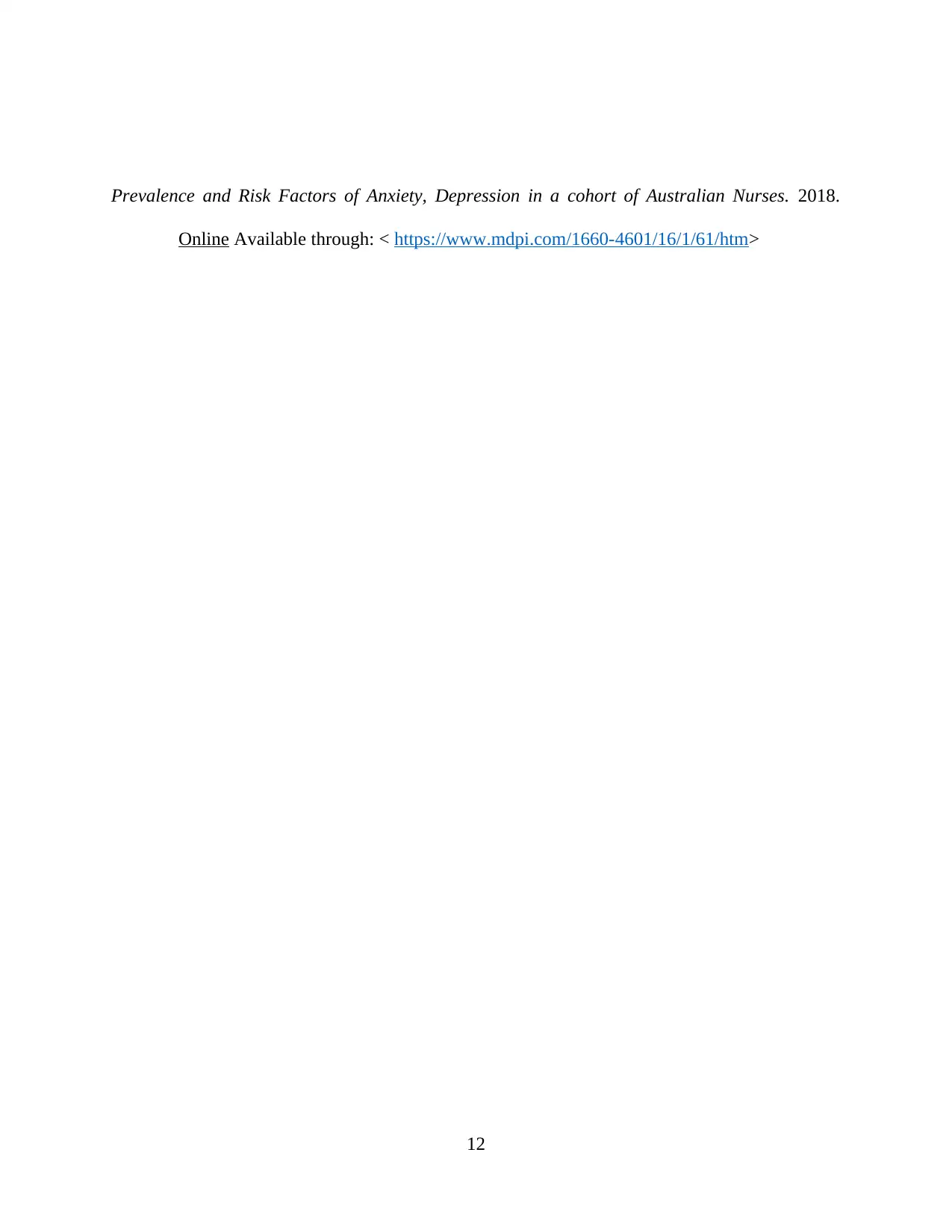
Prevalence and Risk Factors of Anxiety, Depression in a cohort of Australian Nurses. 2018.
Online Available through: < https://www.mdpi.com/1660-4601/16/1/61/htm>
12
Online Available through: < https://www.mdpi.com/1660-4601/16/1/61/htm>
12
⊘ This is a preview!⊘
Do you want full access?
Subscribe today to unlock all pages.

Trusted by 1+ million students worldwide
1 out of 12
Related Documents
Your All-in-One AI-Powered Toolkit for Academic Success.
+13062052269
info@desklib.com
Available 24*7 on WhatsApp / Email
![[object Object]](/_next/static/media/star-bottom.7253800d.svg)
Unlock your academic potential
Copyright © 2020–2026 A2Z Services. All Rights Reserved. Developed and managed by ZUCOL.





